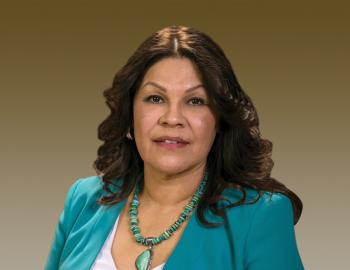Image Caption
Summary
Windspeaker.com Contributor
Marlene Poitras holds firm that advocating for First Nations with both the federal and Alberta governments is foundational to her role as Alberta regional chief with the Assembly of First Nations (AFN).
“My role at its core is to help facilitate dialogue between government and First Nations, and I have a platform I can use to raise issues and advocate for action,” she told Windspeaker.com.
“I’ll continue to build relationships with all levels of government and to open doors for leaders and support making progress on First Nations’ priorities.”
To that end, Poitras points to the memorandum of understanding that sees Canada meet with the AFN at least three times annually, with one of those meetings including Prime Minister Justin Trudeau.
“These meetings give me an opportunity to advocate directly to the ministers and Prime Minister about issues First Nations in my region are experiencing,” she said.
There are a number of issues that need to be addressed in 2020 and the came into force on Jan. 1 with the implementation of the new child and family welfare legislation. That legislation turns control of services over to First Nations, Metis and Inuit. However, how that new law is to roll out is unclear, , says Poitras, both for the First Nations, some of which have their laws “ready to go,” and for the province.
There is a one-year transition period so First Nations can develop their laws and determine how best to run the services, which may include a coordinating agreement with the province. However, to develop systems, funding will be needed up front from the federal government. Once the systems are in place, financing will be required to run those services, Poitras said.
“I’ll push to get more clarity on it and a commitment from the (federal) government.”
Poitras will also be pushing the federal government on its Speech from the Throne commitment to introduce legislation to implement the United Nations Declaration for the Rights of Indigenous Peoples by the end of the year. She points out that the commitment is included in Trudeau’s mandate letters to both Crown-Indigenous Relations Minister Carolyn Bennett and Justice and Attorney General David Lametti.
Poitras isn’t concerned about the time frame that has been set for this work to be completed. She says work undertaken in British Columbia for that province to pass similar legislation took about one year.
“I’ll be advocating with the First Nations in Alberta to start thinking about what we want the bill to look like,” she said. “There’s one thing we know for sure (and that is) that free, prior and informed consent, in particular, is a priority for the treaty chiefs.”
The treaty relationship is important to Poitras.
“Always a priority for me is treaty implementation and treaty-based approach to the funding models, policies and programs; the laws that need to be developed through a treaty-based lens,” she said. “As the federal government settles into their second term, I see an opportunity to start making some real progress in helping realize a treaty-based approach First Nations have been advocating for.”
Treaty implementation and protection are not just a federal concern, but also a priority on the provincial front.
“It’s really critical, especially now given some of the activities that are happening in Alberta, that we ensure the treaties are protected and that anything that we do, in terms of whether it’s dealing with the province or federal government, has to come from the basis of the treaty,” she said.
Poitras points to the proposed sale of Crown lands in the northwestern part of the province. She supports the calls of Treaty 8 First Nations that no land should be changing hands without full consultation with affected First Nations.
The 140,000 hectares of Alberta public land in question is in Mackenzie County in the Peace region, an area which is home to the Treaty 8 First Nations of Beaver, Tall Cree, Little Red River Cree and the Dene Tha, which form the North Peace Tribal Council.
Also on the provincial front is resource development.
“Any type of resource development, anything that occurs in Alberta, we have a treaty … (which) states that (we) agree to share the land to the depth of the plough. Anything underneath that, there has to be some consultation with the First Nations,” said Poitras.
As work goes ahead on the Trans Mountain Pipeline and Indigenous nations and groups—including First Nations from Alberta—express interest in full ownership or partnership, Poitras said, “My role is to advocate on their behalf and open doors and that’s what I’ll continue to do…
“As First Nations move forward in building their nations and their economies, it’s very important that the government listens to what it is in order to do that successfully… It’s critical that anybody that’s dealing with resource development or anything like that, they have to talk to the First Nations and the First Nations will decide what it is they need and want.”
Poitras believes that strong economies allow First Nations to deal with underlying problems, such as poverty, drug crisis, high rates of incarceration, and inadequate policing.
“I believe as First Nations move forward in building their nations and their economies, they have to deal with a lot of the foundational issues … That’s the intent to move away from poverty and build healthy communities,” she said.
“I will continue to advocate to ensure our issues are being heard.”

